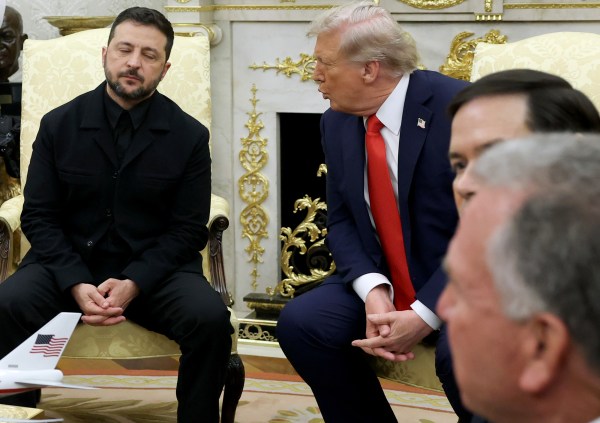President Donald Trump’s post-election circus of denial casts in bright relief the damage Trumpism has done to conservatism. The ease with which so many Republicans and supposedly conservative thought leaders have parroted his specious election fraud stories underscores a deeper problem: the all-out embrace of grievance politics, which is the rhetorical and epistemological cornerstone of Trumpism.
Victimization, the core of grievance politics, has captured much of the conservative mind, and in case anyone doubted that it could produce real destruction, the events at the U.S. Capitol on January 6 settled the matter. Trump’s populism has always been more about an aggrieved anti-elitism than bolstering the economic situation of the working class or whatever other worthy cause we have been told repeatedly he was elected to fulfill. By embracing Trumpism, his supporters have discarded the virtues of responsibility and prudence that have long characterized conservatism.
There is a famous Ronald Reagan quote that some Trumpists probably recited in their pre-Trump careers: “We must reject the idea that every time a law’s broken, society is guilty rather than the lawbreaker. It is time to restore the American precept that each individual is accountable for his actions.” Trumpists have proved willing to disregard and even break laws because they believe themselves to be the victims of a guilty society masterminded by activists and elites.
In a January 6 tweet, removed by Twitter before the president was permanently banned from the platform, Trump proclaimed after his supporters invaded the U.S. Capitol, “These are the things and events that happen when a sacred landslide election victory is so unceremoniously & viciously stripped away from great patriots who have been badly & unfairly treated for so long. Go home with love & in peace. Remember this day forever!” (emphasis added).
This type of rhetoric—that violent protest is justified when the unjustly powerful take what is not theirs from the powerless—is familiar turf to the activist left, which conservatism has a proud history of opposing. Not anymore.
The signatories of the December 10 statement from the Conservative Action Project, an umbrella organization of conservative movement leaders dedicated to “constitutional conservatism based on first principles,” claimed that the “unlawful and invalid” election outcome was the result of “a coordinated pressure campaign by Democrats and allied groups.” Rudy Giuliani said in December that fear “of the elite reaction” was the one big obstacle to Republicans speaking up about election fraud. Evangelical Trump booster Eric Metaxas, who said he would be glad to die in the stolen-election fight, claimed in November that the alleged election fraud was “like holding a rusty knife to the throat of Lady Liberty.” Fox News host Tucker Carlson declared, “It’s not your fault; it’s their fault,” to the violent protesters the day after the insurrection. In their letter of support for the Texas lawsuit, 126 Republican members of the House of Representatives claimed that the “constitutional authority of state legislatures was simply usurped by various governors, state courts, state election officials, and others” (emphasis added).
These themes—abuse by elites, the end of America, conspiratorial usurpation—recur over and again among Trumpian purveyors of grievance politics. Their common feature is an implicit loss of faith in the virtues of civic duty and personal responsibility. Like children who blame others for problems they have caused themselves or who don’t have the patience to utilize proven solutions, peddlers of victimization in today’s political life have converted learned helplessness into a virtue. When progressives engage in this kind of behavior, conservatives call them childish. It is no less childish when conservatives do it, and it is no way to run a republic.
Conservatism at its core holds that the ordered liberty on which our society depends is maintained first and foremost by actions of individuals, prior to the actions of the state. G.K. Chesterton once wrote, “In short, the democratic faith is this: that the most terribly important things must be left to ordinary men themselves—the mating of the sexes, the rearing of the young, the laws of the state.” This is why, he said, the principle of democracy is “analogous to writing one’s own love-letters or blowing one’s own nose. These things we want a man to do for himself, even if he does them badly.”
This is why conservatives have always made such a big deal of prudence, which Edmund Burke famously called “the god of this lower world,” as essential to balancing our liberties and traditions. A civil society requires citizens and leaders who understand what history and experience teach them about their obligations, rather than relying on ideological abstractions or fashionable neologisms of the day. Prudence presupposes a sense of responsibility for one’s duties and one’s community. It requires understanding institutions enough to work in and through them rather than vitiating them through power grabs and the airing of grievances. Prudence is antithetical to the pathos of victimization.
It is learned, as Russell Kirk wrote, through the “performance of our duties in community,” and no matter how well-trained our civil servants may be, they “cannot confer justice and prosperity and tranquility upon a mass of men and women deprived of their older responsibilities.” A sense of responsibility for one’s life, community, and country implies a faith in the goodness and efficacy of investing our time in the public and private institutions on which our social order depends.
Bill Buckley wrote in his book Gratitude, “Materialistic democracy beckons every man to make himself a king; republican citizenship incites every man to be a knight”—not out of some archaic notion of chivalry, but from a debt of gratitude to the dead whose sacrifices compel us also to sacrifice our time and treasure for the public good. Gratitude is the basic conservative disposition, as Yuval Levin has written. “Conservatives,” he says, “tend to begin from gratitude for what is good and what works in our society and then strive to build on it, while liberals tend to begin from outrage at what is bad and broken and seek to uproot it.”
America does not need outraged conservatives bent on uprooting that which needs reforming and nourishing. It needs grateful ones who believe that working in and through our public and private institutions is noble and necessary. Alexis de Tocqueville noted early in the 19th century that “everyone takes as zealous an interest in the affairs of his township, his county, and of the whole State, as if they were his own, because everyone, in his sphere, takes an active part in the government of society.” Even the “lower orders” understand that the general prosperity of the country benefits their own welfare, he noticed, and therefore “the citizen looks upon the fortune of the public as his private interest.”
Grievance politics is a dead-end road. It is time for conservatives to call out members of their own community who continue to peddle victimization. They need to recognize once again that individual agency and personal responsibility are essential, and reinforce their understanding that our institutions—political, media, academic, familial, communal—form the public square within which we exercise our prudence and apply our sense of responsibility to real-world issues and challenges. The continual airing of grievances ultimately results in either a self-imposed subservience to the objects of those grievances or, as we saw on January 6, an attempt to overthrow them in a rage. Neither is good, and neither is necessary.
None of this means conservatives should not fight for those who have been excluded—sometimes unfairly and discriminatorily—from institutions. But thinkers and activists on the right have shown they know how to amass clout and representation in politics and the media. They are outnumbered in academia but still have a strong enough presence upon which to build. And they have plenty of communities and families in which to discharge their civic responsibilities. Once enough conservatives recover this way of thinking and acting, the culture of victimization that has overtaken so much territory within conservatism will begin to recede.
Ryan Streeter is the director of domestic policy studies at the American Enterprise Institute.






Please note that we at The Dispatch hold ourselves, our work, and our commenters to a higher standard than other places on the internet. We welcome comments that foster genuine debate or discussion—including comments critical of us or our work—but responses that include ad hominem attacks on fellow Dispatch members or are intended to stoke fear and anger may be moderated.
With your membership, you only have the ability to comment on The Morning Dispatch articles. Consider upgrading to join the conversation everywhere.